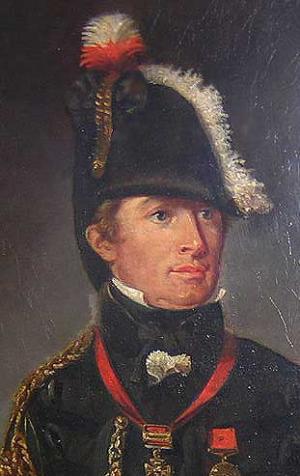 Robert Ross Robert Rossthe
British general who burned Washington, D.C.
during the War of 1812
Robert Ross was born in
Ross-Trevor (now Rostrevor), County Down,
Northern Ireland, in 1766. He graduated from
Trinity College in Dublin, Ireland, and joined
the British Army at the age of 19.
Attaining the rank of Major in
1799, Ross assumed command of the 20th Regiment
in 1803. During the Napoleonic Wars he saw
significant action in Spain, Egypt, Italy, and
the Netherlands. He was wounded three times, and
was awarded three Gold Medals, the Peninsula Gold
Medal, a Sword of Honor, and the thanks of
Parliament for his service. His leadership and
heroism earned him a promotion to Major General
in 1812. Although he was a strict disciplinarian,
Ross was very popular with his men because he
shared their hardships and fought alongside them
on the battlefield.
In 1814, during the War of
1812, Ross was sent to North America with a
4,000-man army and orders to divert the attention
of American forces from other theaters by raiding
the coast. He landed in Maryland in mid-August
and began marching on Washington, D.C. On August
24 his army encountered and defeated American
forces under Brigadier General William Winder at
the Battle of Bladensburg. He and his army
entered a relatively undefended Washington later
that same day, set fire to most of the city's
major buildings (including the President's House
and the Capitol), and had total control of the
city by the next morning.
Encouraged by his easy victory
at Washington, Ross next set his sights on
Baltimore. Setting sail into Chesapeake Bay on
August 26, Ross and his men began landing at
North Point, 14 miles from Baltimore, in the
early morning hours of September 12. While Ross
and his men disembarked and made preparations for
the march on Baltimore, the American field
commander, Brigadier General John Stricker, and
his army of just over 3,100 men were camped less
than four miles away and preparing a defense
against an expected attack. The two forces met
soon after midday. As he had always been known to
do, Ross immediately rode to the front line as
soon as the two armies came together, where he
was felled by a bullet. He died later that day.
Although the Americans were eventually routed,
the British suffered heavy losses.
Ross was buried with full
military honors at St. Paul's Church in Halifax,
Nova Scotia, on September 29, 1814. In 1816, the
officers and men who had served with Ross erected
a 100-foot granite obelisk in his honor on the
shoreline of Carlingford Bay, Rostrevor.
Questions or comments about
this page?
|



